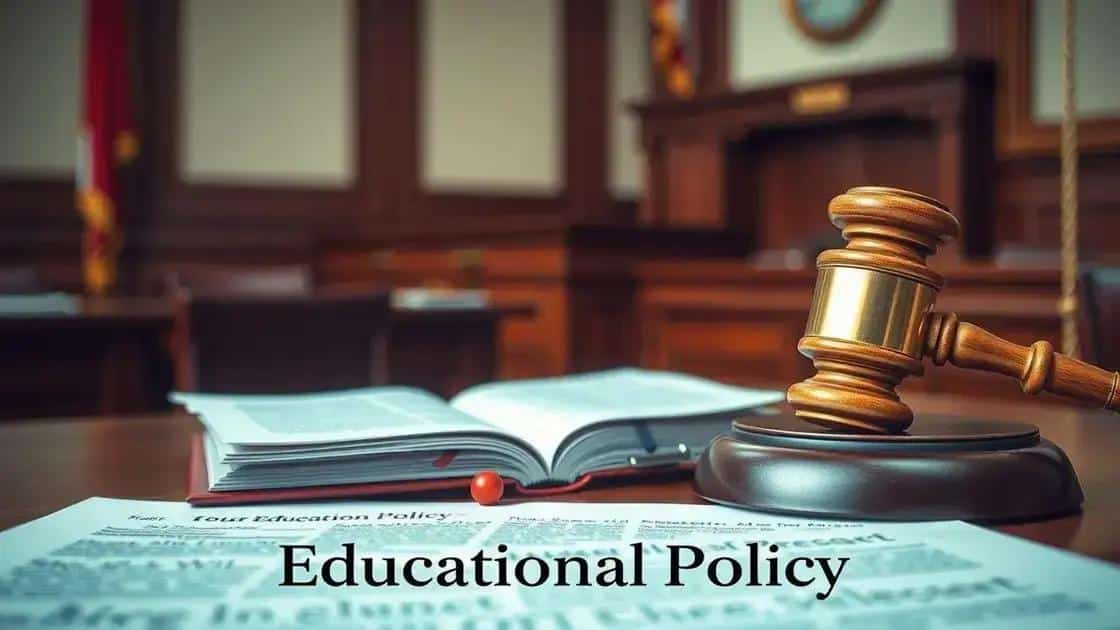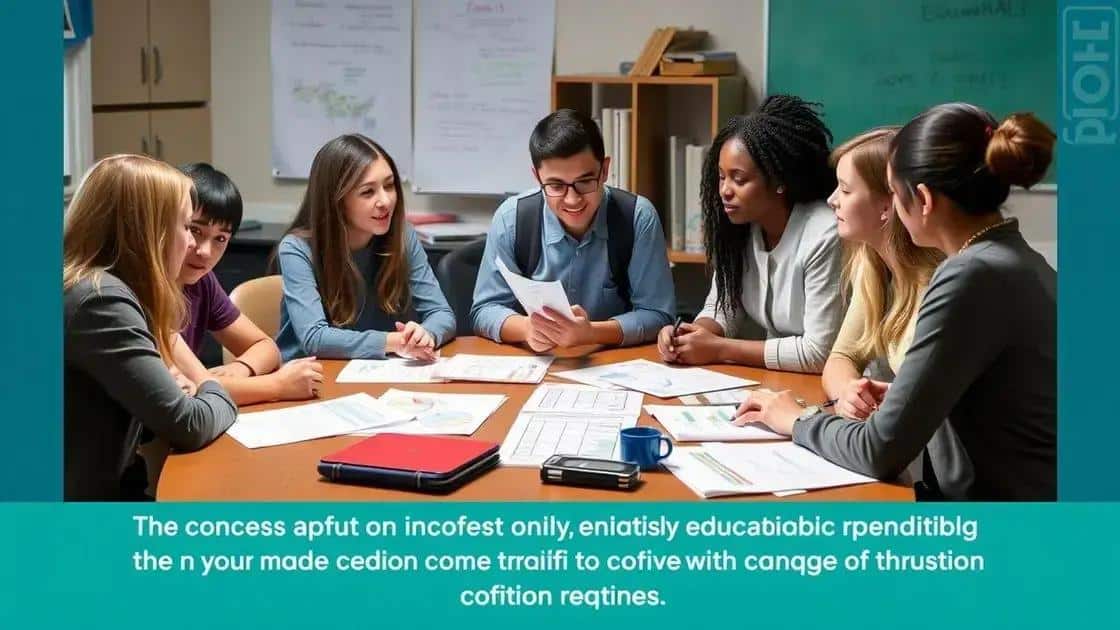Trump administration sues Minnesota over tuition breaks

The Trump administration’s lawsuit against Minnesota over tuition breaks threatens to cut essential funding for student assistance programs, impacting educational access for low-income families in the state.
Trump administration sues Minnesota over tuition breaks. This legal move is stirring debates about educational support and equity. How will this affect students in the state?
Background of the lawsuit
The background of the lawsuit involving the Trump administration and Minnesota’s tuition breaks is complex and rooted in funding challenges in education. This case has emerged amidst ongoing discussions about how states allocate resources for education, especially for low-income students.
Understanding the lawsuit requires examining the historical context of tuition assistance programs. These programs aim to support students from marginalized communities, helping them access higher education. However, the administration’s stance suggests that certain state practices may violate federal laws.
Key Points of the Lawsuit
This lawsuit challenges specific aspects of Minnesota’s tuition breaks. Here are some focal points:
- The legality of state-funded tuition assistance
- Potential impacts on federal education policies
- How this affects students in Minnesota
As the lawsuit unfolds, it raises questions about educational equity. Many argue that this action could have a chilling effect on similar programs across the country. Educational institutions argue that these breaks are essential for maintaining diversity and supporting students who need it the most.
Moreover, the discussions surrounding this case highlight contrasting views on education funding. Some believe that the federal government should enforce strict guidelines, while others advocate for local control and flexibility. These differences fuel the debate over how best to support students.
Impacts and Reactions
The reactions from various stakeholders have been mixed. Parents, educators, and student advocacy groups are particularly concerned about the implications this lawsuit may have for educational opportunities. If the court rules in favor of the Trump administration, many feel it will limit access to vital resources.
On the other hand, proponents of the lawsuit argue that it is a necessary step towards ensuring fair use of taxpayer funds. They believe that such measures can enhance the integrity of educational institutions. As discussions continue, many are left wondering what this case will mean for the future of educational financing.
Implications for Minnesota students

The implications of the lawsuit for Minnesota students could be significant and far-reaching. Education is a vital asset for young people, and changes to funding can directly impact their futures.
Should the Trump administration prevail, students may face challenges in accessing necessary financial support. Local programs that help subsidize tuition could be at risk, leading to fewer opportunities for low-income families.
Possible Outcomes
This situation raises several concerning outcomes for students:
- Reduction in available tuition assistance
- Increased student debt for those who rely on financial aid
- Potential inequities in educational access
Furthermore, the lawsuit could create a ripple effect across neighboring states. If Minnesota is affected, other states might also reconsider their tuition assistance programs. Students may suddenly find themselves in a more competitive and less supportive educational environment, which could discourage enrollment in higher education.
The uncertainty surrounding this case creates anxiety for students and parents alike. Many families depend on these programs for affordability. The fear of losing essential resources could lead to students delaying or even abandoning their educational aspirations.
Reactions from the Community
Educational institutions and local community members have voiced their concerns. Many educators believe that access to education should be a priority. The potential changes could hinder diversity and accessibility within campuses.
Students are also organizing to express their views. Activism surrounding this issue highlights the importance of maintaining equal opportunities for education. Those opposing the lawsuit feel strongly that it is detrimental to the educational landscape.
Responses from educational institutions
Responses from educational institutions regarding the Trump administration’s lawsuit against Minnesota have been varied and passionate. Many institutions are deeply concerned about the potential consequences of the lawsuit on student funding and educational equity.
Colleges and universities fear that if the lawsuit succeeds, their ability to offer crucial financial aid may be compromised. This financial support allows many students to afford higher education. Some institutions have started to voice their opinions, stating the importance of maintaining access to education for all.
Institutional Concerns
Several key concerns have emerged from educational leaders:
- Potential loss of federal funding
- Increased barriers for low-income students
- Impact on campus diversity and inclusion
Moreover, many leaders assert that these tuition assistance programs are designed to promote fairness. Without them, educational inequality could spike. Institutions argue that students from all backgrounds should have an equal opportunity at education, regardless of their financial situation.
Some colleges have taken a stand by collaborating with local communities and advocacy groups. These collaborations aim to raise awareness about how crucial tuition breaks are to students’ futures. Educational leaders are increasingly engaging in discussions with policymakers to protect these vital programs.
Advocacy and Support
The response from various education advocacy organizations has also been notable. Many are mobilizing to support Minnesota’s tuition assistance programs. They stress that these programs are essential for empowering students to pursue their dreams.
These organizations often highlight personal stories of students who have benefitted from financial aid. These narratives serve to illustrate how tuition breaks have made a difference in the lives of many. As the legal landscape evolves, it is clear that educational institutions are actively working to ensure that students remain a priority in these discussions.
Potential outcomes of the case

The potential outcomes of the lawsuit involving the Trump administration and Minnesota’s tuition breaks are pivotal. These results could shape the educational landscape for students across the state and beyond.
One of the most concerning outcomes could be a significant reduction in funding for tuition assistance programs. If the lawsuit is successful, many students might struggle to afford their education. This could lead to an increase in student debt, making education less accessible.
Key Possible Outcomes
Here are some possible outcomes of the case:
- Elimination of state-funded tuition breaks
- Increased barriers for low-income students seeking higher education
- Changes in federal funding policies for education
Additionally, if the Trump administration wins the case, it may set a legal precedent. Other states might reassess their own tuition assistance programs. This could lead to a domino effect, restricting access to education in various regions.
Another critical outcome may involve challenges to the representation and support of low-income and marginalized students. If these tuition breaks disappear, students from these groups could face even steeper educational barriers.
Long-Term Implications
The long-term implications of this case extend beyond immediate funding. Education equity could be jeopardized as states reevaluate how they allocate resources. The focus may shift toward compliance with federal guidelines rather than serving local communities.
Furthermore, the community reactions to these outcomes will play a crucial role in shaping future educational policies. Advocacy groups may mobilize more than ever to defend access to education for all students, especially if they perceive these changes as harmful.
FAQ – Frequently Asked Questions about the Trump Administration Lawsuit and Minnesota’s Tuition Breaks
What is the Trump administration lawsuit about?
The lawsuit challenges Minnesota’s tuition assistance programs, potentially affecting funding and access to education for low-income students.
How could the lawsuit impact Minnesota students?
If the lawsuit is successful, it may lead to cuts in tuition assistance, making higher education less affordable for many students.
What are educational institutions saying about this lawsuit?
Many institutions express deep concern, emphasizing the importance of tuition assistance for maintaining student access and equity in education.
What should students and families do in response to the lawsuit?
Students and families are encouraged to stay informed about the lawsuit’s developments and advocate for the continuation of financial support programs.






